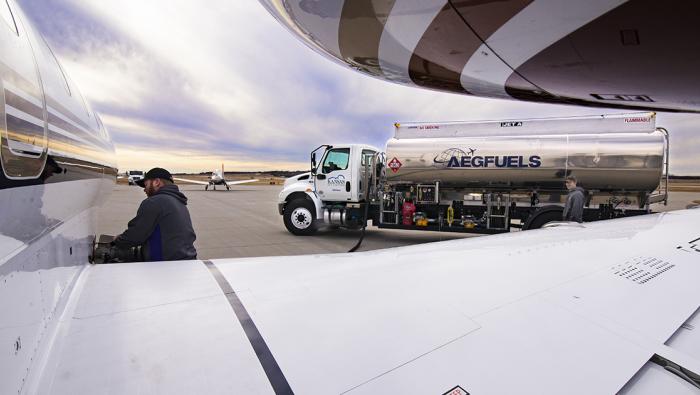|
Joby Aviation has agreed to acquire the passenger flight operations of Blade Air Mobility and will use the business as a key part of its plans to launch eVTOL air-taxi services. The companies announced the $125 million transaction today, saying that Joby will be a partner for Blade’s medical transportation unit, which is to continue operating as a separate public company. Though not publicly acknowledged in the announcement, the takeover of Blade’s passenger operations seems to ensure that Blade will exclusively use the four-passenger aircraft that Joby is aiming to bring to market in early 2026. Loss-making Blade Air Mobility has previously announced partnerships and provisional orders with at least two other eVTOL aircraft developers—Eve Air Mobility and Beta Technologies. According to Joby, Blade will be directly involved in its efforts to launch commercial passenger services in Dubai next year. The acquisition is set to unlock “immediate market access and infrastructure across key urban corridors in New York City and Southern Europe,” Joby said. Last year, Blade flew more than 50,000 passengers in helicopters in the U.S. and France. Blade founder and CEO Rob Wiesenthal will continue to lead the passenger operations unit as a wholly owned subsidiary of Joby. |
|
|
Business aviation flight activity in North America increased by 1.7% in the first half, marking a turnaround after sliding for the past 2.5 years, Argus International reported in its 2025 Mid Year Business Aviation Review. During the first six months Part 135 moved back into positive territory, with flight activity up 2%, while fractional activity “continues to be a shining star,” marking another 7.9% growth and its fifth year in a row of gains. But Part 91 activity was down a percentage point. By aircraft type, midsize jets led the increases, up by 2.7%, followed by turboprops and light jets, up 1.7% each. Large-cabin jet activity nudged into the positive side, up 0.3%. The North American market represented two-thirds of global activity over the first half, averaging 285,000 flights from January through June. European countries collectively accounted for 14.7% of global departures. In Europe, activity remained down overall, off 1.2% in the first half. Even so, three of the six months during the period have marked increases, including most recently May and June. In other areas of the globe, business aviation activity remained strong during the first half, jumping by 18.9% from the same period a year ago. Counting all regions, business aviation activity went up 3.8% during the first half. Looking forward, Argus anticipates activity to remain slightly above (by 0.3%) second-half 2024 levels. |
|
|
Aero Centers has added a second facility at Florida’s Lakeland Linder International Airport (KLAL) with the acquisition of the Sheltair FBO there. The acquisition makes Aero Centers the sole FBO provider at KLAL and brings its footprint there to more than 30 acres, including more than 125,000 sq ft of hangar and office space. This provides “significant development potential for expanded operations and future growth,” the company said. “This acquisition represents our continued investment in locations that serve high-growth regions with strong aviation infrastructure,” said Michael Scheeringa, co-founder and co-CEO of Aero Centers holding company SAR Trilogy Management. “Lakeland is ideally positioned to complement our portfolio, and we are excited to bring Aero Centers’ high-touch customer experience and operational excellence to this dynamic market.” Aero Centers president and COO Geoff Heck added that the Sheltair facility reflects the company’s commitment to operational and service excellence. Further, the company hopes to grow alongside the airport, support its evolving role in cargo and commercial service, and further its partnership with the Sun ‘n Fun Aerospace Expo held annually in early April. Plans call for investments in facility improvements, customer amenities, and hospitality, Aero Centers said. The latest acquisition joins a list of Aero Centers expansions that included growth in Atlanta; Casper, Wyoming; Spokane, Washington; Wilmington, North Carolina; and Tallahassee, Florida. |
|
|
KlasJet, a private jet charter company under the Avia Solutions Group umbrella, is expanding into the Asian market, announcing it will base an aircraft in Singapore by year-end and plans to open a regional office there with dedicated sales support. “The Asian region is essential to us for several key reasons,” said KlasJet CEO Justinas Bulka. “It is a market with a consistent demand for luxury and personalized travel services. Secondly, the region has several global business hubs from which frequent international travel occurs, and the demand for private aircraft charter services is very high.” KlasJet will offer on-demand private charter solutions for clients ranging from corporate travelers to professional sports teams. The company’s largest airplanes—Boeing 737s, configured for 56 to 104 passengers—also will be deployed in Asia as needed. To lead the effort, KlasJet has appointed Cami Ho as sales development manager for Asia. “I am excited to bring my experience and industry knowledge to KlasJet and contribute to the company’s strategic expansion in the Asian market,” Ho said. Initial focus markets include Singapore, South Korea, Japan, Malaysia, and Hong Kong, where KlasJet sees high commercial potential. |
|
|
Sponsor Content: AEG Fuels AEG Fuels delivers global aviation fuel solutions with 24/7 support, competitive pricing, and tailored services across 3,000+ locations. From fuel management and trip support to FBO distribution and real-time dispatch, AEG ensures efficient and reliable operations for every flight mission, whether commercial, military, charter, or business. Worldwide coverage, world-class service. |
|
|
Bombardier holds nearly 30% of the business jet market share in South America, accounting for 650 of the 2,200 jets there, according to Bombardier v-p Michael Anckner. “Brazil is the country that drives the region,” he told AIN, pointing to increasing numbers of high-net-worth residents. In June, Bombardier brought two aircraft—a Challenger 3500 and Global 7500—to the 2025 Catarina Aviation Show in São Paulo. The super-midsize Challenger can reach the U.S. or Europe in one stop from Brazil, while the ultra-long-range Global has been well received. Anckner emphasized that Bombardier’s strength lies in having “a broad product range which can fit customer needs,” whatever they are. The manufacturer will expand this portfolio with the service entry of the Global 8000 later. Aircraft purchases “are typically about business growth,” Anckner said. “We see customers move up as their business expands.” He identified agribusiness as the sector that has shown the largest growth in Brazil over the last decade, though he noted that “it is not necessarily our largest sector.” Support for Bombardier aircraft in Brazil is handled by MAGA Aviation, which operates facilities at São Paulo Catarina International Executive Airport (SBJH). While some customers prefer its Miami-Opa Locka Executive Airport (KOPF) repair center, Anckner noted that Bombardier has five other maintenance centers in the region. |
|
|
Fractional-share aircraft provider NetJets has made GE Aerospace’s FlightPulse app available to pilots to monitor their performance as derived from the GE flight data monitoring (FDM) program that NetJets uses. The app is available to the more than 4,400 NetJets pilots in the U.S. and Europe. Pilots typically don’t have direct or rapid access to FDM or flight operational quality assurance information, and FlightPulse quickly shows each pilot their individual results and compares them to averages according to specific aircraft types. A typical day gathers data from 2.5 million flights. “In the world of aviation, safety is paramount and will always be NetJets’ first and highest priority, integral to every decision we make,” said NetJets chairman and CEO Adam Johnson. “As the industry leader, it is our responsibility to elevate our safety programs by utilizing cutting-edge tools like FlightPulse to continue to bring best-in-class service to our customers worldwide.” “This collaboration marks a significant milestone, expanding the global reach of business jet pilots using our software,” said Andrew Coleman, president and general manager at GE Aerospace Software as a Service. “Together, we are helping to drive innovation and safety in aviation by providing pilots with actionable, data-driven insights to optimize every flight.” |
|
|
The U.S. Department of Transportation’s Office of Inspector General (OIG) is launching an investigation into the FAA’s communication of spectrum use. The One Big Beautiful Bill passed in July directed the National Telecommunications and Information Administration (NTIA) and the Federal Communications Commission (FCC) to auction government-owned spectrum to the private sector. “While such auctions can raise billions of dollars and advance innovation, they reduce the spectrum available for aviation and may increase the risk of interference to safety-critical systems,” the OIG said, noting that the FAA is the manager and largest direct user of the spectrum within the DOT. This includes different frequency bands for air traffic control systems, mobile phones, and other complex communication networks. While calling for the sale, Congress last year in the FAA Reauthorization Act of 2024 asked for the DOT OIG to focus on FAA's processes for communicating the position of civil aviation operators and the safety of the National Airspace System (NAS) to NTIA when the latter agency considers spectrum reallocations and decisions. To kick off this month, the audit will look into the FAA’s communications with NTIA on safety risks surrounding spectrum reallocations. The more recent directive calling for the auction of spectrum has raised concerns from key Democrats, including Senate Commerce Committee ranking member Maria Cantwell (D-Washington), who reminded Transportation Secretary Sean Duffy of the problems created by the last spectrum reallocation. |
|
|
Switzerland-based Private Flight has launched a digital platform designed to help freelance and independent flight attendants manage in-flight catering. The Cabin Crew platform is now available globally and connects users to more than 2,000 caterers, restaurants, and hotels across 175 countries. “We are happy to integrate our significant global experience working with cabin crew on almost every aircraft type into this version of our catering management platform, which is ultimately designed to support cabin crew [in providing] a great experience to their passengers,” said Richard Pryor, founder and CEO of Private Flight. “Our technology, proven processes, and professional procurement support will help control cost while still ensuring the crew can deliver a high standard of catering.” The platform enables users to browse menus, coordinate changes, track orders, and process payments, all from a mobile device. Transparent pricing and cost controls are built in, allowing flight attendants to streamline catering operations while ensuring high service levels. Part of Private Flight’s broader catering management platform, the new tool supports cabin crew working on flights for VIP owners and charter operations, offering a practical solution to common challenges with in-flight catering. |
|
AVIATION SAFETY QUESTION OF THE WEEKHow is advection fog formed?
|
|
|
AIN’s Corporate Aviation Leadership Summit (CALS) Mx, set for November 3-4 in Scottsdale, Arizona, will address the latest topics, strategies, and solutions in business aviation. The summit is attendee-centric, serving as an educational and professional networking opportunity that connects directors of maintenance and corporate aviation leaders with peers, industry experts, and solution providers in a relaxed environment. The event is limited to 50 attendees, so we encourage you to apply to attend this all-expenses-paid event as our guests. |
|
|
|
|
|
|
AINalerts News Tips/Feedback: News tips may be sent anonymously, but feedback must include name and contact info (we will withhold name on request). We reserve the right to edit correspondence for length, clarity, and grammar. Send feedback or news tips to AINalerts editor Chad Trautvetter. |
|
AINalerts is a publication of AIN Media Group, 214 Franklin Avenue, Midland Park, New Jersey. Copyright 2025. All rights reserved. Reproduction in whole or in part without permission is strictly prohibited. |

















